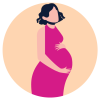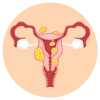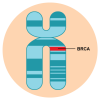

Malaysians mourned with sadness as news of one of our most talented local female artiste plastered on local tabloids in the year 2022 the jovial-natured Adibah Noor Mohamed Omar had lost her battle to Stage 4 ovarian cancer. The news triggered much discussion amongst various healthcare communities and the Ministry of Health (MOH) minister even released a press statement to promote awareness of the second most deadly gynaecological cancer worldwide ovarian cancer (OC).

According to the Cancer Research Malaysia organisation, OC is less common than its other gynaecological rivals: breast or cervical cancer. In fact, it is the fourth most common malignancy affecting Malaysian women.
OC is now recognised as having detectable early symptoms including abdominal distension (bloating, increased abdominal size), pelvic and/or abdominal pain, problems with eating (loss of appetite, feeling full quickly), and frequent urination. However, many women are not aware of these non-specific symptoms and often misattribute them to other benign medical conditions, ageing or stress — resulting in late detection and treatment.
OC cases can be prevented by eliminating and reducing risk factors. There are several notable predisposing factors which are associated with increased risk of ovarian cancer, as well as protective factors which lower the risk for OC.

Risk increases with age after 40 years old

Having more children

Menstrual related factors

Oral contraception

Hormonal replacement therapy (HRT)

Higher age of childbirth

Family history of OC

Endometriosis

BRCA gene mutations

Breastfeeding

Alcohol, caffeine & cigarettes

A woman with who has a strong family history of breast or OC in more than one relative or has family members with certain genetic mutation related cancers. Specifically, ovarian cancer screening may be recommended for women who are eligible to undergo genetic testing for BRCA1, BRCA2 mutation or Lynch syndrome (due to high family risks) who have or have not chosen to proceed for such genetic testing. In this group, OC screening may be started at age 30 to 35, or 5 to 10 years earlier than the age when the youngest family member was diagnosed. Additionally, screening may include a blood test for CA 125 and a pelvic ultrasound.

Women in this category do not have a personal or family history of OC. Screening for ovarian cancer is not commonly recommended in these women. However, they should discuss their risks for ovarian cancer with a health care provider.
Ovarian cancer is more lethal than its other cancer counterparts because there is no single effective screening tool. Thus, most OC patients are detected in the later stages of cancer resulting in higher mortality. Therefore, the challenge is for women everywhere to understand their bodies and be alert to their changes so that they can seek treatment earlier.
Life Care Diagnostic Medical Centre Sdn. Bhd. 200401034597 (673106-V)
Bangsar South
WhatsApp: 0122343610
1st Floor, Wisma Lifecare,
No. 5, Jalan Kerinchi, Bangsar South,
59200 Kuala Lumpur
Cheras South
WhatsApp: 01127213620
19A-2 & 19B-2, Block E, Kompleks Komersil Akasa,
Jalan Akasa, Akasa Cheras Selatan,
43300 Seri Kembangan, Selangor
Operating Hour:
Monday – Friday: 8.00am – 5.00pm
Saturday: 8.00am – 1.00pm
Sunday & Public Holidays: Closed
